Beechnuts vs. Ginkgo nuts — In-Depth Nutrition Comparison
Compare
The main differences between beechnuts and ginkgo nuts
- Beechnuts are richer in manganese, copper, vitamin B6, vitamin B2, iron, vitamin B5, and potassium, yet ginkgo nuts are richer in vitamin B3 and phosphorus.
- Daily need coverage for manganese for beechnuts is 53% higher.
- Beechnuts contain 18 times more saturated fat than ginkgo nuts. Beechnuts contain 5.719g of saturated fat, while ginkgo nuts contain 0.319g.
Food types used in this article are Nuts, beechnuts, dried and Nuts, ginkgo nuts, raw.
Infographic

Infographic link
Mineral Comparison
Mineral comparison score is based on the number of minerals by which one or the other food is richer. The "coverage" charts below show how much of the daily needs can be covered by 300 grams of the food.
| Contains more PotassiumPotassium | +99.4% |
| Contains more IronIron | +146% |
| Contains more CopperCopper | +144.5% |
| Contains more ManganeseManganese | +1086.7% |
| Contains more MagnesiumMagnesium | +∞% |
| Contains more CalciumCalcium | +100% |
| Contains more PhosphorusPhosphorus | +∞% |
| Contains less SodiumSodium | -81.6% |
Vitamin Comparison
Vitamin comparison score is based on the number of vitamins by which one or the other food is richer. The "coverage" charts below show how much of the daily needs can be covered by 300 grams of the food.
| Contains more Vitamin B1Vitamin B1 | +38.2% |
| Contains more Vitamin B2Vitamin B2 | +312.2% |
| Contains more Vitamin B5Vitamin B5 | +478.1% |
| Contains more Vitamin B6Vitamin B6 | +108.5% |
| Contains more FolateFolate | +109.3% |
| Contains more Vitamin AVitamin A | +∞% |
| Contains more Vitamin B3Vitamin B3 | +584.2% |
All nutrients comparison - raw data values
| Nutrient |  |
 |
DV% diff. |
| Polyunsaturated fat | 20.089g | 0.618g | 130% |
| Fats | 50g | 1.68g | 74% |
| Manganese | 1.341mg | 0.113mg | 53% |
| Monounsaturated fat | 21.892g | 0.619g | 53% |
| Copper | 0.67mg | 0.274mg | 44% |
| Vitamin B3 | 0.877mg | 6mg | 32% |
| Vitamin B6 | 0.684mg | 0.328mg | 27% |
| Saturated fat | 5.719g | 0.319g | 25% |
| Vitamin B2 | 0.371mg | 0.09mg | 22% |
| Calories | 576kcal | 182kcal | 20% |
| Iron | 2.46mg | 1mg | 18% |
| Phosphorus | 0mg | 124mg | 18% |
| Potassium | 1017mg | 510mg | 15% |
| Vitamin B5 | 0.925mg | 0.16mg | 15% |
| Folate | 113µg | 54µg | 15% |
| Vitamin B1 | 0.304mg | 0.22mg | 7% |
| Magnesium | 0mg | 27mg | 6% |
| Protein | 6.2g | 4.32g | 4% |
| Vitamin A | 0µg | 28µg | 3% |
| Vitamin C | 15.5mg | 15mg | 1% |
| Carbs | 33.5g | 37.6g | 1% |
| Sodium | 38mg | 7mg | 1% |
| Net carbs | 33.5g | 37.6g | N/A |
| Calcium | 1mg | 2mg | 0% |
| Zinc | 0.36mg | 0.34mg | 0% |
| Tryptophan | 0.069mg | 0.071mg | 0% |
| Threonine | 0.221mg | 0.268mg | 0% |
| Isoleucine | 0.245mg | 0.209mg | 0% |
| Leucine | 0.367mg | 0.316mg | 0% |
| Lysine | 0.367mg | 0.206mg | 0% |
| Methionine | 0.146mg | 0.055mg | 0% |
| Phenylalanine | 0.262mg | 0.171mg | 0% |
| Valine | 0.346mg | 0.283mg | 0% |
| Histidine | 0.172mg | 0.102mg | 0% |
Macronutrient Comparison
Macronutrient breakdown side-by-side comparison
Protein:
6.2 g
Fats:
50 g
Carbs:
33.5 g
Water:
6.6 g
Other:
3.7 g
Protein:
4.32 g
Fats:
1.68 g
Carbs:
37.6 g
Water:
55.2 g
Other:
1.2 g
| Contains more ProteinProtein | +43.5% |
| Contains more FatsFats | +2876.2% |
| Contains more OtherOther | +208.3% |
| Contains more CarbsCarbs | +12.2% |
| Contains more WaterWater | +736.4% |
Fat Type Comparison
Fat type breakdown side-by-side comparison
Saturated fat:
Sat. Fat
5.719 g
Monounsaturated fat:
Mono. Fat
21.892 g
Polyunsaturated fat:
Poly. Fat
20.089 g
Saturated fat:
Sat. Fat
0.319 g
Monounsaturated fat:
Mono. Fat
0.619 g
Polyunsaturated fat:
Poly. Fat
0.618 g
| Contains more Mono. FatMonounsaturated fat | +3436.7% |
| Contains more Poly. FatPolyunsaturated fat | +3150.6% |
| Contains less Sat. FatSaturated fat | -94.4% |




